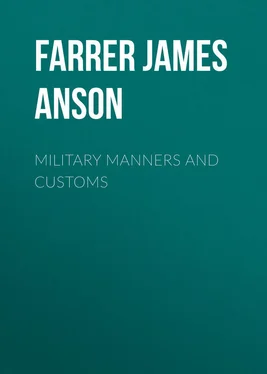James Farrer - Military Manners and Customs
Здесь есть возможность читать онлайн «James Farrer - Military Manners and Customs» — ознакомительный отрывок электронной книги совершенно бесплатно, а после прочтения отрывка купить полную версию. В некоторых случаях можно слушать аудио, скачать через торрент в формате fb2 и присутствует краткое содержание. Жанр: foreign_antique, foreign_prose, на английском языке. Описание произведения, (предисловие) а так же отзывы посетителей доступны на портале библиотеки ЛибКат.
- Название:Military Manners and Customs
- Автор:
- Жанр:
- Год:неизвестен
- ISBN:нет данных
- Рейтинг книги:5 / 5. Голосов: 1
-
Избранное:Добавить в избранное
- Отзывы:
-
Ваша оценка:
- 100
- 1
- 2
- 3
- 4
- 5
Military Manners and Customs: краткое содержание, описание и аннотация
Предлагаем к чтению аннотацию, описание, краткое содержание или предисловие (зависит от того, что написал сам автор книги «Military Manners and Customs»). Если вы не нашли необходимую информацию о книге — напишите в комментариях, мы постараемся отыскать её.
Military Manners and Customs — читать онлайн ознакомительный отрывок
Ниже представлен текст книги, разбитый по страницам. Система сохранения места последней прочитанной страницы, позволяет с удобством читать онлайн бесплатно книгу «Military Manners and Customs», без необходимости каждый раз заново искать на чём Вы остановились. Поставьте закладку, и сможете в любой момент перейти на страницу, на которой закончили чтение.
Интервал:
Закладка:
James Anson Farrer
Military Manners and Customs
PREFACE
In the present volume I have attempted within the limits of the historical period and of our European civilisation, and without recognising any hard and fast line between ancient and modern, Christian and Pagan, to allude, in the places that seemed most appropriate, to all points in the history of war that appeared to be either of special interest or of essential importance. As examples of such points I may refer to the treatment of prisoners of war, or of surrendered garrisons; the rules about spies and surprises; the introduction of, and feeling about, new weapons; the meaning of parts of military dress; the origin of peculiar customs like the old one of kissing the earth before a charge; the prevalent rules of honour, as displayed in notions of justice in regard to reprisals, or of fairness in stratagems and deception. The necessity of observing in so vast a field the laws of proportion has enforced resort to such condensation, that on subjects which deserve or possess their tomes upon tomes, I have in many cases been unable to spend more than a page or a chapter. It is easier, however, to err on the side of length than of brevity, but on whichever side I have exceeded, I can only hope that others, who may feel the same interest with myself in the subject without having the same time to give to it, may derive a tithe of the pleasure from reading the following nine chapters that I have found in putting them together.
The study, of course, is no new one, but there can be no objection to calling it by the new name of Bellology – a convenient term, quite capable of holding its own with Sociology or its congeners. The only novelty I have aimed at is one of treatment, and consists in never losing sight of the fact that to all military customs there is a moral and human side which has been only too generally ignored in this connection. To read books like Grose’s ‘Military Antiquities,’ one would think their writers were dealing with the manners, not of men but of ninepins, so utterly do they divest themselves of all human interest or moral feeling, in reference to the customs they describe with so laudable but toneless an accuracy.
The starting-point of modern bellological studies will, undoubtedly, always be the Parliamentary Blue Book, containing the reports (less full than one might wish) of the Military International Conference that met at Brussels in 1874, to discuss the existing laws and customs of war, and to consider whether any modification of them were either possible or desirable. Most of the representatives appointed to attend by the several Powers were military men, so that we are carried by their conversation into the actual realities of modern warfare, with an authority and sense of truth that one is conscious of in no other military book. It is to be regretted that such a work, instructive as it is beyond any other on the subject, has never been printed in a form more popular than its official dress. It was from it that I first conceived the idea of the following pages, and in the sequel frequent reference will be made to it, as the source of the most trustworthy military information we possess, and as certain to be for some time to come the standard work on all the actual laws and customs of contemporary warfare.
CHAPTER I.
THE LAWS OF WAR
Ce sont des lois de la guerre. Il faut estre bien cruel bien souvent pour venir au bout de son ennemi; Dieu doit estre bien miséricordieux en nostre endroict, qui faisons tant de maux. – Marshal Montluc.
The prohibition of explosive bullets in war – The importance of the Declaration of St. Petersburg of 1868 – The ultimate triumph of more destructive methods – Illustrated by history of the cross-bow or the musket; or of cannons, torpedoes, red-hot shot, or the bayonet – Numbers slain in modern and earlier warfare – The laws of war at the Brussels Conference of 1874 – Do the laws of war tend to improve? – A negative answer suggested from reference: (1) to the use of poison in war; (2) to the bombardment of towns; (3) to the destruction of public buildings; (4) to the destruction of crops and fruit trees; (5) to the murder of prisoners or the wounded; (6) to the murder of surrendered garrisons; (7) to the destruction of fishing boats; (8) to the disuse of the declaration of war; (9) to the torture and mutilation of combatants and non-combatants; (10) to the custom of contributions – The futile attempts of Grotius and Vattel to humanise warfare – The rights of war in the time of Grotius – The futility of international law with regard to laws of war – The employment of barbarian troops – The taking of towns by assault – The laws of war contrasted with the practice – War easier to abolish than to humanise.
It is impossible to head a chapter ‘The Laws of War’ without thinking of that famous chapter on Iceland headed ‘The Snakes of Iceland,’ wherein the writer simply informed his readers that there were none in the country. ‘The laws of war’ make one think of the snakes of Iceland.
Nevertheless, a summary denial of their existence would deprive the history of the battle-field of one of its most interesting features; for there is surely nothing more surprising to an impartial observer of military manners and customs than to find that even in so just a cause as the defence of your own country limitations should be set to the right of injuring your aggressor in any manner you can.
What, for instance, can be more obvious in such a case than that no suffering you can inflict is needless which is most likely permanently to disable your adversary? Yet, by virtue of the International Declaration of St. Petersburg, in 1868, you may not use explosive bullets against him, because it is held that they would cause him needless suffering. By the logic of war, what can be clearer than that, if the explosive bullet deals worse wounds, and therefore inflicts death more readily than other destructive agencies, it should be used? or else that those too should be excluded from the rules of the game – which might end in putting a stop to the game altogether?
The history of the explosive bullet is worth recalling, for its prohibition is a straw to clutch at in these days of military revival. Like the plague, and perhaps gunpowder, it had an Eastern origin. It was used originally in India against elephants and tigers. In 1863 it was introduced into the Russian army, and subsequently into other European armies, for use against ammunition-waggons. But it was not till 1867 that a slight modification in its construction rendered it available for the destruction of mankind. The world owes it to the humanity of the Russian Minister of War, General Milutine, that at this point a pause was made; and as the Czar, Alexander II., was no less humane than his minister, the result was the famous Declaration, signed in 1868 by all the chief Powers (save the United States), mutually foregoing in their future wars by land or sea the use of projectiles weighing less than 400 grammes (to save their use for artillery), either explosive or filled with inflammable substances. The Court of Berlin wished at the time for some other destructive contrivances to be equally excluded, but the English Government was afraid to go further; as if requiring breathing time after so immense an effort to diminish human suffering, before proceeding in so perilous a direction.
The Declaration of St. Petersburg, inasmuch as it is capable of indefinite expansion, is a somewhat awkward precedent for those who in their hearts love war and shield its continuance with apologetic platitudes. How, they ask, can you enforce agreements between nations? But this argument begins to totter when we remember that there is absolutely no superior power or tribunal in existence which can enforce the observance of the St. Petersburg Declaration beyond the conscience of the signatory Powers. It follows, therefore, that if international agreements are of value, there is no need to stop short at this or that bullet: which makes the arbitration-tribunal loom in the distance perceptibly nearer than it did before.
Читать дальшеИнтервал:
Закладка:
Похожие книги на «Military Manners and Customs»
Представляем Вашему вниманию похожие книги на «Military Manners and Customs» списком для выбора. Мы отобрали схожую по названию и смыслу литературу в надежде предоставить читателям больше вариантов отыскать новые, интересные, ещё непрочитанные произведения.
Обсуждение, отзывы о книге «Military Manners and Customs» и просто собственные мнения читателей. Оставьте ваши комментарии, напишите, что Вы думаете о произведении, его смысле или главных героях. Укажите что конкретно понравилось, а что нет, и почему Вы так считаете.












